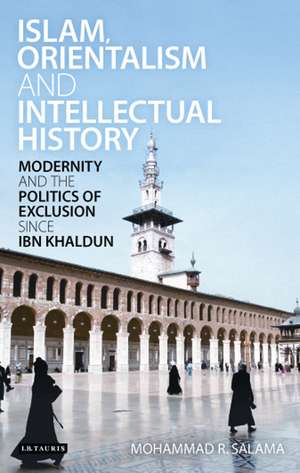Islam, Orientalism and Intellectual History: Modernity and the Politics of Exclusion Since Ibn Khaldun
Autor Mohammad R. Salamaen Limba Engleză Paperback – 24 mar 2013
Preț: 166.45 lei
Preț vechi: 203.98 lei
-18% Nou
Puncte Express: 250
Preț estimativ în valută:
31.85€ • 34.71$ • 26.84£
31.85€ • 34.71$ • 26.84£
Carte tipărită la comandă
Livrare economică 23 aprilie-07 mai
Preluare comenzi: 021 569.72.76
Specificații
ISBN-13: 9781780764504
ISBN-10: 1780764502
Pagini: 288
Ilustrații: 7 bw integrated, 2 maps
Dimensiuni: 138 x 216 x 22 mm
Greutate: 0.37 kg
Editura: Bloomsbury Publishing
Colecția I.B.Tauris
Locul publicării:London, United Kingdom
ISBN-10: 1780764502
Pagini: 288
Ilustrații: 7 bw integrated, 2 maps
Dimensiuni: 138 x 216 x 22 mm
Greutate: 0.37 kg
Editura: Bloomsbury Publishing
Colecția I.B.Tauris
Locul publicării:London, United Kingdom
Notă biografică
Mohammad R. Salama is Assistant Professor of Arabic at San Francisco State University and specializes in modern Arabic literature, Arab colonial and postcolonial thought, intellectual history and Arab cultural studies. He is the co-editor of German Colonialism: Race, the Holocaust, and Postwar Germany (2011).
Cuprins
IllustrationsNote on Translation and TransliterationAcknowledgementsPrologue: Thinking about Islam and the West 1 Fact or Fiction? How the Writing of History Became a Discourse of Conquest 2 Postcolonial Battles over Ibn Khaldun: Intellectual History and the Politics of Exclusion 3 How did Islam make it into Hegel's Philosophy of World History? 4 The Emergence of Islam as a Historical Category in British Colonial Thought 5 Disciplining Islam: Colonial Egypt, A Case Study Epilogue: Historicizing the Global, Politicizing Islam, Giving Violence a New Name Notes BibliographyIndex
